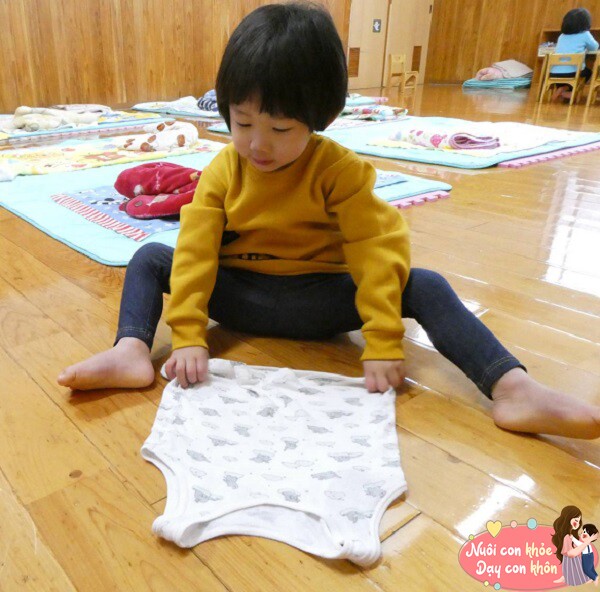Being overly permissive as a parent when your child is young can lead to regrets later on. Therefore, it’s essential for parents to be “tough” when necessary, without spoiling or overprotecting their children.
Specifically, if parents can let go of these four things, they will foster their child’s independence, sense of responsibility, and self-worth.


Strictly discipline your child when they make mistakes
When your child makes a mistake, it’s important to be “tough” and help them understand the rules, respect boundaries, and know what they should and shouldn’t do.
A well-known concept in psychology is the “hot stove rule,” which states that if someone breaks a rule, they will get burned, just like touching a hot stove. Simply put, if you don’t know how to discipline your child, you can apply this rule and use appropriate measures to help them understand their mistake and change their behavior.
First, always follow the principle that “mistakes should be punished.” Don’t dismiss your child’s mistakes as minor or harmless, or think that they’re too young to understand, so it’s okay.
As a parent, you should follow the rules yourself and let your child know that if they make a mistake, they will be held accountable.
Next, the punishment must fit the crime. The purpose of discipline is to help your child recognize their mistake and not repeat it, while also ensuring that the punishment is reasonable and achieves the desired goal without causing harm.
Lastly, be consistent when disciplining your child. Some parents may impose harsh punishments but then feel guilty and retract them to comfort their child. This contradictory behavior is ineffective and can confuse your child, making them unsure of your intentions.
Discipline is not an end in itself but a means to help your child recognize their mistakes and correct them. By being tough on your child when necessary, you’re teaching them to move forward, learn from their mistakes, and develop a sense of responsibility.

Strictly discipline your child when they make mistakes.

Firmly encourage your child to be persistent
In the early 20th century, psychologist Michael Anderson and pediatrician Tim Johansson observed that children and adolescents today often lack diverse perspectives and perseverance.
They attributed this to the easy access to information and entertainment through modern technology, which has made it harder for young people to be patient and resilient in the face of challenges and failures during their development and learning journey.
For children who give up easily, parents should be “tough” and provide opportunities for them to experience the sense of accomplishment that comes from hard work. Letting your child overcome challenges, even small ones, will teach them the value of effort and persistence.
When your child faces difficulties and eventually achieves their goal, they will feel a sense of satisfaction and confidence, motivating them to continue striving in the future.
Persistence is a fast track to success. When parents don’t shy away from their supervisory and supportive roles, children will have the opportunity to develop persistence and avoid giving up easily.
Wise parents will create an encouraging environment where their children can experiment, fail, and try again. They will set reasonable and challenging goals, provide positive feedback, and motivate their children to keep striving.
Additionally, fostering persistence will equip children with essential life skills for the future. In a world full of uncertainties and challenges, the ability to overcome obstacles and maintain motivation is invaluable.

Provide opportunities for your child to experience the sense of accomplishment that comes from hard work.

Let your child experience the consequences of laziness
There’s a saying that goes, “Children’s laziness is nurtured by their parents.” Many parents complain that their children don’t do things properly, such as not folding their clothes neatly or not washing fruit before eating it. While these habits can be frustrating, it’s important to recognize that fostering independence and responsibility in children is a shared responsibility between the individual and the family.
When parents intervene too much in their children’s daily lives, it can create a sense of dependence and prevent them from learning essential skills. On the other hand, involving your child in household chores like folding laundry, washing fruit, or cleaning their room will teach them the value of hard work and responsibility.
Eventually, your child will leave the nest and enter society. That’s why it’s crucial to equip them with life skills from an early age. View this as an educational process where your child can explore their potential and build self-confidence.
Educator Chen Heqin said, “Let children do what they can.” This emphasizes the importance of encouraging independence in children.
Children can learn and understand through their own experiences, and even if they fail, they can still gain valuable lessons. When they face setbacks, they will learn patience, problem-solving, and adaptability.

Involve your child in household chores to teach them the value of hard work and responsibility.

Let your child experience the feeling of failure
According to philosopher Herbert Spencer, “Disappointment is the best teacher for children, and parents should let them experience it.”
In life, many parents don’t want to see their children disappointed, so they immediately fulfill their every request.
However, a child who grows up being constantly indulged tends to have a weak will and low resilience to failure.
Therefore, in daily life, instead of hovering over your child, let them experience appropriate levels of dissatisfaction.
All plants and trees in nature thrive due to the sun and wind. Tall trees cannot be grown in a greenhouse; they need to face the elements to become stronger. The same is true for children.
Loving your child is instinctual, but true love often comes from being “tough” in the right way.




































